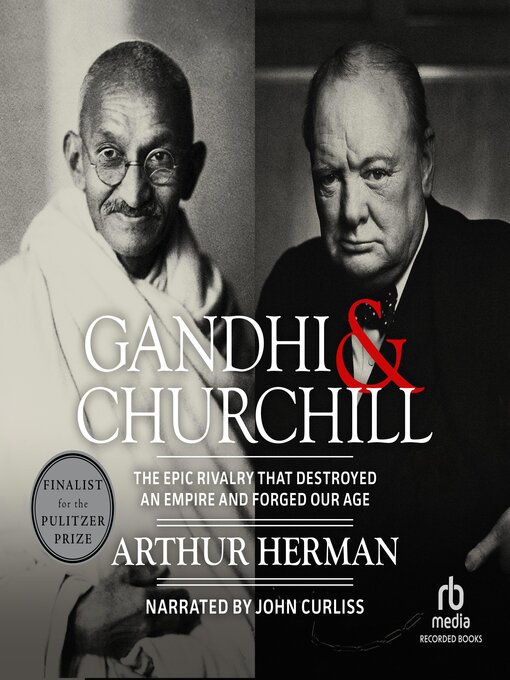- All Fiction
- Military Fiction
- Historical Fiction
- Mystery & Thriller
- Romance
- See all fiction collections
Gandhi & Churchill
The Epic Rivalry That Destroyed an Empire and Forged Our Age
They were born worlds apart: Winston Churchill to Britain's most glamorous aristocratic family, Mohandas Gandhi to a pious middle-class household in a provincial town in India. Yet Arthur Herman reveals how their lives and careers became intertwined as the twentieth century unfolded. Both men would go on to lead their nations through harrowing trials and two world wars—and become locked in a fierce contest of wills that would decide the fate of countries, continents, and ultimately an empire.
Gandhi & Churchill reveals how both men were more alike than different, and yet became bitter enemies over the future of India, a land of 250 million people with 147 languages and dialects and 15 distinct religions—the jewel in the crown of Britain's overseas empire for 200 years.
Over the course of a long career, Churchill would do whatever was necessary to ensure that India remain British—including a fateful redrawing of the entire map of the Middle East and even risking his alliance with the United States during World War Two.
Mohandas Gandhi, by contrast, would dedicate his life to India's liberation, defy death and imprisonment, and create an entirely new kind of political movement: satyagraha, or civil disobedience. His campaigns of nonviolence in defiance of Churchill and the British, including his famous Salt March, would become the blueprint not only for the independence of India but for the civil rights movement in the U.S. and struggles for freedom across the world.
Now master storyteller Arthur Herman cuts through the legends and myths about these two powerful, charismatic figures and reveals their flaws as well as their strengths. The result is a sweeping epic of empire and insurrection, war and political intrigue, with a fascinating supporting cast, including General Kitchener, Rabindranath Tagore, Franklin Roosevelt, Lord Mountbatten, and Mohammed Ali Jinnah, the founder of Pakistan. It is also a brilliant narrative parable of two men whose great successes were always haunted by personal failure, and whose final moments of triumph were overshadowed by the loss of what they held most dear.
"A forceful portrait of the emergence of the postcolonial era in the fateful contrast—and surprising affinities—between two historic figures. ... Fascinating."—Publishers Weekly
-
Creators
-
Publisher
-
Release date
July 21, 2008 -
Formats
-
OverDrive Listen audiobook
- ISBN: 9781456106577
- File size: 847015 KB
- Duration: 29:24:36
-
-
Languages
- English
-
Reviews
-
AudioFile Magazine
The author of HOW THE SCOTS INVENTED THE MODERN WORLD has produced an epic. This sprawling audiobook covers the lives of the two leaders and opponents in detail from cradle to grave. The presentation shifts back and forth between the two protagonists in comprehensible blocks that are chronological and generally easy for the listener to follow. Still, the cascade of people and place names, dates and campaigns can be overwhelming. John Curless gives a flawlessly paced, no-frills narration in clear BBC English. He meets the many pronunciation challenges with aplomb, with the odd exception of SATYAGARHA (the core concept in Gandhi's philosophy), of which he always seems tentative. F.C. (c) AudioFile 2008, Portland, Maine -
Publisher's Weekly
March 10, 2008
Historian Herman (How the Scots Invented the Modern World
) paints a forceful portrait of the emergence of the postcolonial era in the fateful contrast—and surprising affinities—between two historic figures on opposite sides of the struggle for Indian independence. Churchill and Gandhi, both elites in their respective milieus, began their careers with remarkably similar perspectives and trod intersecting paths across India, South Africa and England. They shared an obsession with physical courage (albeit channeled in different ways) that tied conceptions of masculinity to larger ideas of racial identity and moral superiority—and India loomed large in their triumphal careers, ultimately frustrating both men’s idealism. While Herman’s dual biography artfully depicts the personalities of the two men, he gives short shrift to the more complex forces of British imperial decline, Indian nationalism and the emergence of the postwar order (for example, Herman helpfully but also too neatly explains the dogged centrality of India and the British raj in Churchill’s worldview as an act of filial loyalty to his beloved father) But the author also takes careful account of the constellation of modern and antimodern currents of late Victorian thought in situating these vastly influential figures in a fascinating narrative of their times.
-
Formats
- OverDrive Listen audiobook
subjects
Languages
- English
Loading
Why is availability limited?
×Availability can change throughout the month based on the library's budget. You can still place a hold on the title, and your hold will be automatically filled as soon as the title is available again.
The Kindle Book format for this title is not supported on:
×Read-along ebook
×The OverDrive Read format of this ebook has professional narration that plays while you read in your browser. Learn more here.


